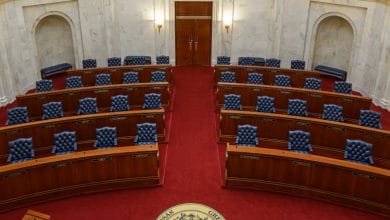The $250 million income tax relief to be implemented from 2015-2022 that the Governor and other Republicans have passed and continue to point out was completely overshadowed with almost $400 million in new taxes passed or supported by the legislature in a single week.
SB336 that increases the gas tax passed at the beginning of the week and a proposed constitutional amendment for a new half-cent sales tax passed through both chambers. The amendment will be voted on by the people in the 2020 general election. The proposed amendment drew no questions, no debate, and passed in about one minute.
A bill to reduce unemployment taxes paid by employers and a bill to slightly expand the scope of practice for optometrists both passed the Arkansas House. A tenants’ rights bill was pulled to get consensus between landlords’ and tenants’ interests.
As things currently stand, the people of Arkansas can expect a significant net tax increase from legislation and constitutional amendment proposals passed so far this session. With delayed implementation of tax cuts and a proposed constitutional amendment, the yearly impact may be delayed a few years, but once fully enacted into law, the results will be a net increase on taxpayers. WAIT! That is not all. There are more tax increase measures promised by our Republican legislature (internet sales, cigarette/vaping, cell phones—to name a few.)
You can read details on some of the top stories from last week below, courtesy of Conduit News:
- $300 Million Tax Increase Proposal Passes In One Minute With No Debate
- Tenant’s Rights Bill Pulled for Amendments After Lengthy Debate
- Optometry Scope Expansion Bill Passes Arkansas House
- Unemployment Tax Cut Passes Final Hurdle
- Arkansas Legislator Move to Add Additional Legislative Session
- Arkansas Bill Would Remove Regulations On Hair Braiding
- Bill Filed to Search for Savings in State Government
- VIDEO: AR State Rep Julie Mayberry Reacts to Passage of Highway Bills
- VIDEO: AR State Rep Rick Beck: 1% Government Agencies Reduction Needed
- VIDEO: AR State Rep Jack Ladyman on Scope of Practice and Funding Roads
New Bills to Watch:
SUPPORT – HB1752/HB1753 – Improving the Minimum Wage Law
By: Rep. Robin Lundstrum (R – Elm Springs)
HB1752 would amend the Arkansas minimum wage law by exempting employers with less than twenty-five employees, a private nonprofit developmental service provider, and private nonprofit organizations with an annual budget less than $1 million. HB1753 would exempt people under 21 and college students from the minimum wage law.
In the 2018 General Election voters approved an increase to the minimum wage that rises to $11 per hour by 2021. For large companies, the costs are passed on to consumers through higher prices or inferior products/services.
This directly increases costs to small businesses and for many, the drastic rise may cause them to close their businesses entirely. Workers making minimum wage are hit hardest as companies look to cut hours or terminate employees to adjust for the increases.
Arkansas has the highest minimum wage in the area. When adjusting for percentage of median wage, Arkansas would have the HIGHEST minimum wage in the entire country.
CFA does not support a minimum wage law. The free market and free people should be allowed to freely contract for providing goods and services.
Exempting the groups in the proposed legislation would provide lower labor costs for small businesses in Arkansas and improve economic freedom.
SUPPORT – SB521 – Expanding Freedom of Information Law
By: Sen. Kim Hammer (R – Benton)
This bill is a response to SB231 failing in committee, legislation also filed by Sen. Hammer. The bill would expand application of the freedom of information law by updating the definition of what is a public record subject to FOIA. Records by a private foundation with the primary purpose of providing direct financial support to a public university or college would not be considered public records. This would allow FOIA attempts for records through the places like the Razorback Foundation, Red Wolf Foundation, and other foundations that support government universities.
This would increase transparency, expanding access to information on the uses of taxpayer money and government purposes. The “private entity” shield should be pierced.
OPPOSE – HB1705 – Stifling Free Speech Against Candidates for Judicial Office
By: Rep. Jimmy Gazaway (R – Paragould)
This bill would stifle free speech and statements made against judges and candidates for judge in Arkansas during campaign season. Any money spent that attempts to influence a vote for or against a specific candidate or set of candidates or the public’s perception of a candidate or set of candidates would be defined as an expenditure requiring disclosure of who is spending that money. With such a broad definition any Facebook boosted post, newspaper article, blog post, or any other statements could effectively become an independent expenditure requiring disclosure. Public posting of the name, address, place of business, occupation, and employer name must be disclosed of any person making statements that may influence a person’s perception of a judicial candidate.
Almost any statement, good or bad, could influence a person’s perception of a candidate for office. The bill would put a chilling effect on a person’s ability to engage in free speech and also to educate voters on what a candidate for office has done. A provision of the bill seeks to exempt news articles, opinion pieces, editorials, and communications between organizations but a lawsuit would likely have to ensue to determine what would fit under that exemption.
The bill would also allow special interest opponents of free speech to bring a lawsuit against a person to force compliance with the new regulation. This would almost immediately send a flurry of lawsuits by individuals who want to attempt to silence speech with which they disagree or believe may influence voters against their position. That is a wide-open door for shutting down free speech.
The effort is in response to ads, mailers, and other information provided during the recent Arkansas Supreme Court race that informed the voters of Arkansas of the true, documented, publicly available information about Justice Courtney Goodson. While possibly unflattering, the information, as any information would, influenced the perception of a candidate for office. Goodson won re-election despite the mailers and tv ads.
This is bad legislation that would stifle free speech against government and government actors. Transparency is for government, privacy is for the people.
OPPOSE – SJR15 – Creating Lifetime Legislators with Cooling Off Periods
By: Sen. Alan Clark (R – Lonsdale)
This is a proposed constitutional amendment that would change term limits for legislators, providing for lifetime service with short cooling off periods, and permanently banning the people of Arkansas to set term limits for their legislators, with the legislature themselves only being able to set term limits moving forward.
Specifically, the bill would allow any legislator to serve 12 years in the state legislature before sitting out. A legislator would have to sit out for 4 years but could then return to the legislature. They could do this for an unlimited number of 12-year periods, as long as they sit out four years in between. Currently, after the legislature increased term limits a few years ago with a misleading ballot title, legislators can serve 16 total years.
This ballot title itself is misleading in that it says it is “reducing term limits” for the general assembly. While it would decrease the amount of consecutive time served, from 16 years to 12 years, it would drastically open up the amount of time a legislature can serve in Little Rock to an unlimited amount. The bill would allow current legislators who would cap out at 16 years to return immediately after sitting out for four years. That is just one term for State Senators. The bill would also adjust judicial term limits and set them at twelve years, with four year cooling off periods in between.
Finally, the bill would forever ban the people of Arkansas from decreasing or changing in any way term limits of their elected officials. Instead, the legislators themselves would be the only ones who could adjust term limits.
This is a government growth measure that would ensure further entrenchment of state legislators into the system of big government controlled by special interests. The longer a legislator is in Little Rock the closer they get to special interests and lobbyists and further removed from the people of their district. We should not increase the time a person can be a legislator and should not prohibit the people from changing term limits on their elected officials.







